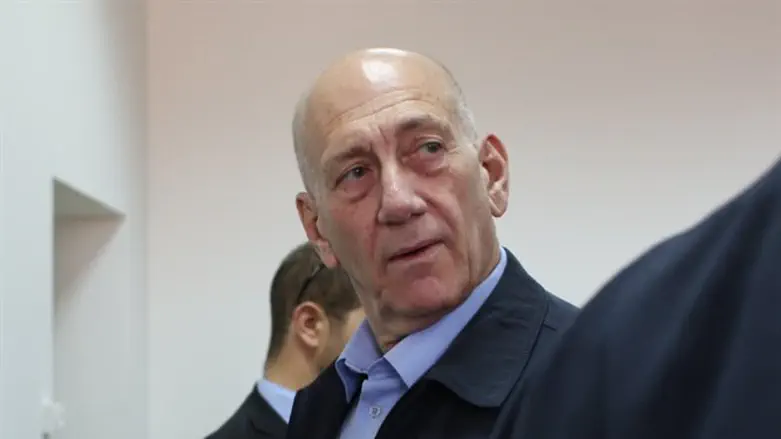
Following the request by Prime Minister Binyamin Netanyahu's lawyers to absent himselt from his arraignment trial this Sunday, former Prime Minister Ehud Olmert attacked Netanyahu in an interview with Ben Caspit and Yinon Magal.
Olmert referred to Netanyahu's request to be absent from his trial, saying that "he is not sure he should not be in meetings, there will be meetings where his presence could be useful."
He explained that during the hearings, a large number of witnesses will be called for him and against him, and his presence can have a positive or negative effect and it is important to consider this: "His presence will cause irritation or anger at the witnesses who testify against him and the rage incurred by them against him will erupt precisely when they see him. There may also be an opposite situation that the fact that he is there will deter some people from speaking against him in the same way they might have spoken against him in his absence." According to him, "the excuse that he cannot come because he is busy with state affairs - it is an unspectacular excuse and an attempt to evade the event."
Ben Caspit pointed out to Olmert that while conducting police investigations against him, Yehuda Weinstein, who was then one of his legal advisors, suggested that he not resign and continue to run his trial from the prime minister's chair, and wondered whether today, watching Netanyahu, he regretted resigning. The former prime minister expressed no regrets at all: "I decided to resign because I estimated very early on, when the State Attorney approached the court the day after my first one-hour investigation, he asked that Talansky give prior testimony before there is a case against me, before a decision, before a hearing, a summons, nothing that I will sit on the bench. It was clear to me one thing, no matter what I did and what I would not do, what would be investigated and what would not be investigated - he had already decided that there would be a trial and that I would be a defendant at trial. "
He also emphasized that there was no real impediment to continuing to serve as prime minister, but "it was clear to me that if I dragged this matter on, it would be inevitable in such a situation that I'd be dragged to the places where Bibi went." In his opinion, "Bibi, too, when he began to struggle, didn't think he'd reach the abyss he came to and where he brought the State of Israel and its institutions." Olmert explained that this is the nature of the process, "When you start to fight you're dragged into a public confrontation; when you're dragged into public confrontation you're dragged in front of the Attorney General and then the investigators, the judges, and finally you are in places that I thought were inevitable to reach."
Later, he expressed his opinion on the issue of the rotation between Netanyahu and Gantz, claiming that "a coalition built on fraud, mistrust, and lies cannot stand." In his view, the coalition will fall apart even before they reach the stage of rotation: "there'll be crises earlier. It's impossible to run a government with 35 ministers and 16 deputy ministers because what's enacted is only the laws concerning the personal status of the alternate prime minister and prime minister. Distrust will arise that will result in the whole thing falling apart."
In conclusion, the former prime minister addressed the issue of annexation, claiming that "the prime minister is a pathological coward. He will do nothing when threatened, he won't annex the territories as he didn't annex the magnometers to the entrance to the Temple Mount." Olmert warned against "unilateral annexation that this government is doing - it is an atomic bomb that can crush the stability of the Middle East, undermine everything that's happening here, disrupt everything we've achieved in terms of political stability."